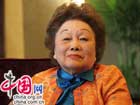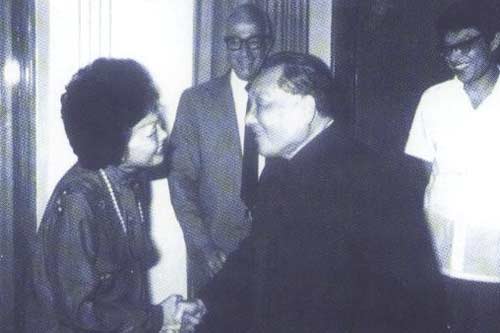| Videos | ? Latest |
|
? Feature | ? Sports | ? Your Videos |
Anna Chennault: Sino-US 'secret ambassador' (6)

American political star
No one will deny that the legend of Anna began with her marriage to Claire Chennault. In 1949, she left for Taiwan with her husband. But in July 1958 came the black day when Chennault died of lung cancer.
A strong woman, the death of her husband did not slow Anna's career. After his death, Anna settled in the U.S. with their two children. She received an honorary Doctor of Literature Degree from Chungang in Seoul, Korea in 1967, and an honorary degree at Lincoln University in San Francisco.
Anna took a variety of jobs - becoming chief of the Chinese section of the machine translation research department at Georgetown University, a broadcaster for the Voice of America, a lecturer, a writer, a fashion designer, and one of the key executives of Flying Tiger Line for which she handled many contract negotiations.
She was very active in Republican Party affairs, with posts including co-chairwoman of the Republican National Committee's Finance Committee (1966-1983) and was twice chairwoman of the National Republican Heritage Groups Council.
Because she helped a number of Republican presidential candidates in elections, she gained the trust of the White House. Presidents Kennedy, Johnson, Nixon, Ford, Carter, and Reagan all asked her to take on various informal tasks for them. In 1963, President Kennedy named her the chairman of the Chinese Refugees Relief Committee, making her the first person of Chinese ancestry to be appointed to the White House staff.
According toNixon, A Lifeby Jonathan Aitken, after an unexpected encounter with Anna in Taipei, Nixon complained to accompanying congressman Patrick Hillings "She's a chatterbox."
Anna said: "I hope through my efforts, the two super powers (China and U.S.) can work closer. In fact, this is my only motivation. I deeply love these two counties."
Her hard work has been recognized by the international community. In 1966, she won the Freedom Award of the Order of Lafayette and the Freedom Award from the Free China Association; in 1971 she received the Award of Honor from the Chinese-American Alliance.
Bilateral civilian messenger
As Anna became increasingly prominent in mainstream political activities and gradually built up her status in social circles, she came to be known in the U.S. capital as "the hostess of Washington."
In the early 1980s, as the Chinese mainland began to implement its opening-up and reform policy, she naturally served as an envoy between the three points of the triangle – the mainland, Taiwan and the U.S. In 1980, shortly after Ronald Reagan's presidential election victory, she was sent to Beijing as a special ambassador to meet with Deng Xiaoping.
|
Deng Xiaoping meets with Anna Chan Chennault in China in 1980. [Photo by nywcfped.com] |
Today Anna visits the mainland frequently and is an active player in promoting cultural exchanges between China and the U.S., as well as across the Strait.
In 1981, she established the Chen Hsiang-mei Education Prize in more than a dozen cities in the mainland in order to encourage outstanding teachers. The "Chen Hsiang-mei Scholarship," which includes a stipend of $2000, is awarded each spring to persons majoring in Chinese. Each year she travels to various cities to present the award.
Besides creating these awards, she has also founded several "Hsiang-mei schools," covering all costs out of her own pocket.
"I'm interested in education; I think it's the foundation of a strong nation," Anna explained. "I just want to do more for my motherland."
She said she was greatly encouraged and helped by her teachers, and that she would never forget them. She was one of initiators of "Teachers' Day" in China.
From northern China to the south, from Taiwan to the U.S., Anna has experienced both bitterness and sweetness. She sees herself as a wonderful combination of identities.
"During the past three decades, the mainland has changed dramatically. Now it's undertaking the development of the northwestern region (including Tibet, Xinjiang, Gansu, Shaanxi, Sichuan and so forth)," she said. "It has made me determined to go to the northwest, which is backward and in need of help."
 0
0 







